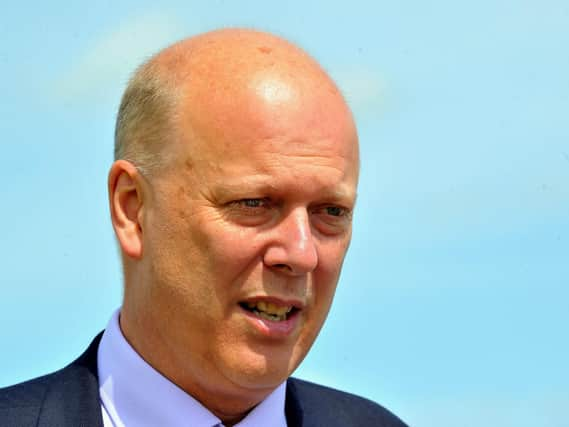Chris Grayling admits he failed to 'ask the difficult questions' in run-up to rail timetabling chaos


But the Transport Secretary said he did not want to “point fingers” after an investigation by the Office for Rail and Road regulator into the May timetable change concluded Network Rail, Govia Thameslink Railway (GTR), Northern, Mr Grayling's Department for Transport and the ORR itself all made mistakes which contributed to the collapse of services.
The report found that “nobody took charge”, there was a “lack of clarity about roles and responsibilities” and the DfT failed to sufficiently question the industry about the risk of major delays and cancellations, and agreed to phase in the Thameslink timetable, stretching resources at Network Rail’s timetabling department.
Advertisement
Hide AdAdvertisement
Hide AdFollowing the publication of the report, Mr Grayling, who has previously insisted "I don't run the railways", said he and the DfT "take responsibility for what we didn't do well enough, which is to ask the difficult questions".
But later, asked if he should take responsibility for the failure, he told BBC Radio 4’s Today programme: "It's tough for a politician to say to professionals in the industry to give you an assurance that something is ready and to tell them they're wrong. The priority now is to make sure this can never happen again."
Mr Grayling responded to the report by announcing plans for a major review of the entire rail industry with the aim of delivering reforms by 2020.
Advertisement
Hide AdAdvertisement
Hide AdBut Tory former Chancellor George Osborne issued a scathing criticism of his former colleague.
“The North of England doesn’t need yet more government reviews about the railways,” he said.
“We know they’re in a mess – this summer confirmed that – and we know what needs to be done to fix them.
“Stop trying to run everything from Whitehall. Give the Northern Powerhouse control of its own rail network. Put franchising into the hands of Transport for the North.
Advertisement
Hide AdAdvertisement
Hide Ad“Let the North work together to make its own decisions about its future. That’s what the Northern Powerhouse is all about.”
The report on the disruption following the botched introduction of new timetables on May 20 found up to 310 planned services a day on Northern network did not run, causing “a significant financial and emotional cost to those passengers affected, directly impacting upon their work and families and in some circumstances their personal safety”.
“This has undermined the trust in the railway and the reliance they place upon it in their lives,” ORR chief Professor Stephen Glaister said.
Advertisement
Hide AdAdvertisement
Hide AdAmong a series of failings, the report traces the root of the problems back to autumn 2017, when Network Rail “worsened” problems caused by delays to completing electrification work near Bolton by wrongly believing it could make up the time over Christmas.
At around the same time, the DfT agreed to phase the introduction of the Thameslink timetable, stretching resources at Network Rail’s timetabling department.
“The industry, as a whole, failed to foresee that these combined factors created a serious risk that the revised timetable could fail,” the report said.
Network Rail’s timetabling department was best placed to understand the risks but “did not take sufficient action”. And neither GTR nor Northern were properly aware of or prepared for the problems in delivering the timetable and did not do enough to provide accurate information to passengers when disruption occurred, the report said.
Advertisement
Hide AdAdvertisement
Hide AdShadow Rail Minister and York MP Rachael Maskell said: "It’s clear that the timetabling chaos was caused because Chris Grayling failed to get the rail industry to work together effectively.
"Today’s report from the rail regulator is merely the latest to highlight the dysfunctional buck passing which goes on across the rail industry.
"As Transport Secretary Grayling has presided over this fiasco, so what confidence can passengers have that he will take finally take responsibility and sort things out before the next set of timetable changes in December? I won’t be holding my breath."
Advertisement
Hide AdAdvertisement
Hide AdA DfT spokesman said: “We welcome these findings and are working with the industry to ensure that such disruption never happens again.” Network Rail chief executive Andrew Haines said the operator was moving towards a “whole system approach” for timetabling”. He said: “I’d like to add my sincerest apologies to passenger for letting them down.”
Northern said it was “deeply sorry” to passengers and accepted the report’s findings and committed to providing better information to customers, including by investing more than £5m in new information screens and public address systems at stations.
“We want to learn the lessons of the May timetable disruption and will be working closely with other organisations across the rail industry to ensure new timetabling is implemented as effectively as possible for customers in the future,” the company said in a statement.
Barry White, chief executive of Transport for the North, said: “The interim findings of this Glaister Review clearly highlight that there is a real need for radical change in the way the rail industry operates."
Advertisement
Hide AdAdvertisement
Hide AdHe added: “The Report’s summary highlights the Rail Delivery Group’s statement that ‘the timetable is our promise to passengers’. This summer, in the North of England, and elsewhere, that promise was broken. That is unacceptable. It was passengers who suffered and that must not be allowed to happen again.”